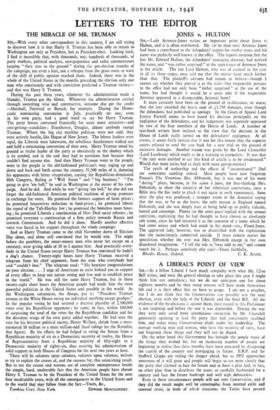LETTERS TO THE EDITOR
THE MIRACLE OF MR. TRUMAN
Snt,—With every other correspondent in this country, I am still trying to discover how it is that Harry S. Truman has been able to return to Washington not only as President, but as President-elect. Looking back, I find it incredible that, with thousands, nay, hundreds of thousands, of
party workers, political analysts, newspapermen and radio commentators keeping " their ears to the ground " during the pre-election months of
the campaign, not even a hint, not a whisper from the grass roots to warn of the shift of public opinion reached them. Indeed, there was in the whole of the United States in the months preceding the election only one man who consistently and with conviction predicted a Truman victory— and that was Harry S. Truman.
During the past three years, whenever the administration made a blunder, Truman got the blame. Whenever the administration carried through something wise 'and constructive, someone else got the credit —Marshall, Forrestal or Baruch, for example. During the Demo- cratic nominating convention in July, practically no one, ' even in his own party, had a good word to say for Harry Truman. The party bosses canvassed frantically for some more attractive—and vote-getting—candidate ; Eisenhower, Douglas, almost anybody except Truman. Where the big city machine politicos were not cold, they were actively hostile, like Hague of New Jersey. The labour leaders were tepid, the Liberals were lukewarm, the rebellious Southerners walked out and held a nominating convention of their own. Harry Truman stood his ground as titular leader of, the party as obstinately as the donkey which is its symbol, and in the end they had to nominate him because they couldn't find anyone else. And then Harry Truman went to the people, went to the people in the old-fashioned politician's way, raging up and down and back and forth across the country, 31,500 miles of it, damning his opponents with bitter vituperation, cursing the Republican-dominated 80th Congress, flailing at " Wall Street " and " big business." " I'm going to give 'em hell," he said in Washington at the outset of his cam- paign. And he did. And while he was " giving 'em hell," he also did not forget the old-fashioned American political tradition of giving promises in exchange for votes. He promised the farmers support of farm prices ; he promised housewives reduction in food-prices ; he promised labour the repeal-of the Taft-Hartley law ; he promised the homeless more hous- ing ; he promised Liberals a continuation of New Deal social reforms ; he promised everyone a continuation of a firm policy towards Russia and towards Communism. And he did it alone. Hardly another effective voice was heard in his support throughout the whole campaign.
And so Harry Truman came to the chill November dawn of Election Day alone, and alone still convinced that he would win. The night before the gamblers, the smart-money men who never bet except on a certainty, were giving odds of 18 to 1 against him. And practically every- body in the United States except Harry Truman was convinced he hadn't a dog's chance. Twenty-eight hours later Harry Truman received a telegram from his chief opponent, from the man who everybody had said " couldn't lose." The telegram read: " My heartiest congratulations on your election.... I urge all Americans to unite behind you in support of every effort to keep our nation strong and free and to establish peace in the world." He was still the same Harry Truman, but in those twenty-eight short hours the American people had made him the most powerful politician in the United States and possibly in the world. As the Washington columnists, the Alsops, put it: "President Truman returns to the White House owing no individual anything except grudges." In the popular voting he had secured a decisive plurality of 2,500,000 votes over his Republican opponent ; he came, in fact, within 100,000 of surpassing the total of the votes for the Republican candidate and for the dissident wings of his own party added together. He had seen the vote for his bitterest political enemy, Henry Wallace, shrink from a once- estimated 10 million to a mere million-odd (hard tidings for the Kremlin, that figure). By his efforts he had helped to swing the Senate from a Republican majority of six to a Democratic majority of twelve, the House of Representatives from a Republican majority of fifty-eight to a Democratic majority of eighty-six, thus assuring his administration of solid support in both Houses of Congress for the next two years at least.
There will be columns upon columns, volumes upon volumes, written to try to explain the causes of, and the reasons for, this astonishing result. But to me the causes and reasons are of complete unimportance beside the simple, hard, unalterable fact that the American people have chosen Harry S. Truman to be the President of the United States for the next four incalculable years, with all the consequences to the United States and to the world that may follow from the fact—Yours, &c.,


































 Previous page
Previous page